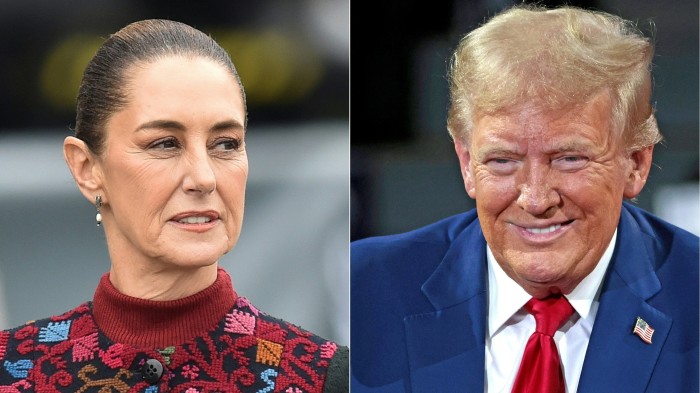Unlock the White House Watch newsletter for free
Your guide to what the 2024 US election means for Washington and the world
US president-elect Donald Trump said he had a “wonderful” conversation with Mexico’s President Claudia Sheinbaum on Wednesday, in an apparent easing of the tensions raised this week over trade tariffs.
The call between the leaders was the first since Trump said on Monday he would put a 25 per cent tariff on all imports from Mexico on his first day in office. He blames the Latin American country for the flow of drugs and migrants north into the US.
In a relatively tough response on Tuesday, Sheinbaum raised the possibility of retaliation and said that a trade war would cause joblessness and inflation in both countries.
But after Wednesday’s phone call, both leaders described the conversation in positive terms. Trump said on Truth Social, his social media platform, that it was a “very productive conversation” and thanked Mexico for its promised efforts.
Mexico is one of the most vulnerable countries to Trump’s threats to impose tariffs because it sends 80 per cent of its exports to its northern neighbour.
The two nations’ 2000-mile shared border has been a source of constant tension over the flow of drugs and migrants north and guns south.
Trump and Sheinbaum did differ, however, on how they presented what Mexico has promised to do to stop migrants arriving at the US Southern border.
Trump indicated that Sheinbaum would stop migration through Mexico, “effectively closing the southern border”.
Sheinbaum said she had explained her country’s efforts to deal with migrants and that her position would “not be to close borders but to build bridges”.
The previous Mexican administration of Andrés Manuel López Obrador managed to avert Trump‘s previous threats of tariffs by beefing up security forces to stop migration and agreeing to take back third-country migrants awaiting asylum claims. Mexico now detains record numbers of migrants.
Analysts have questioned whether Sheinbaum, Mexico’s first female leader who took office in October, will be able to replicate López Obrador’s strategy.
The US-Mexico-Canada Agreement, the updated version of the North American Free Trade Agreement that was signed during Trump’s first term, has led to deep economic integration in many sectors.
Republicans have suggested designating Mexico’s powerful drug cartels as terrorist organisations, opening the door to US military intervention. Trump also regularly mentioned Chinese investment in Mexico as a problem on the campaign trail.
Source link









